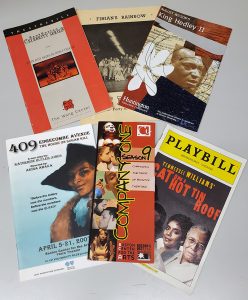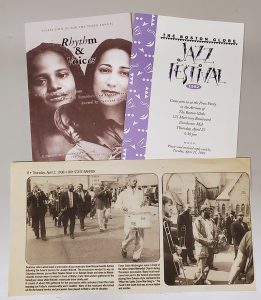What Are the Kay Bourne Papers?

The Emerson College Archives and Special Collections was fortunate enough to add the Katherine D. Bourne Papers to its collections in 2017. They were a gift from Kay Bourne, who passed away on January 31 at the age of 82. She was the arts editor for the local paper The Bay State Banner for four decades.
Banner senior editor Yawu Miller wrote that Bourne took a keen interest in Boston’s Black arts community. “She covered the luminaries of the community with sensitivity and respect, helping generations of artists gain recognition and reach broader audiences,” he said.
Bourne’s collection provides a spotlight on the important contributions that the Black community has made to the arts—including theater, film, photography, music, literature, and dance—in not only the Greater Boston area, but also around the country. It does so by bringing together Bay State Banner newspaper articles, research files, programs, books, photographs, correspondence, playbills, reviews, promotional materials, and ephemera.
“[Kay] was one of those people who just showed everybody love,” noted political activist, poet, and emcee Jamarhl Crawford. He went on to state that her articles covering Black artists in the 1960s captured an important movement that led to the founding of such institutions as the Elma Lewis School.
These articles and related materials continue to inspire students and other researchers by offering an intimate look at this movement as well as important activities, events, and individuals from other decades.
Emerson alumna Elizabeth Deonarain ’18, an archives assistant who inventoried and assisted in preserving the collection, said, “As someone who worked closely with the collection, I spent hours mesmerized and happily lost in the Bourne Papers. The collection is overflowing with materials of Black Bostonian history and the arts, dating as far back as the 1890s. It’s truly a testament to the power one person can have in preserving history.”

A good example can be seen in the many materials focusing on theater. There are original letters from playwright Alice Childress discussing her life, work, and inspirations. There is also a 1972 letter from playwright and Say Brother writer/producer Hazel Bright discussing her desire to apply for the MIT Community Fellows Program, which allowed participants to create and implement a program or project focused on meeting a significant need in their community.
The theater materials also include articles, playbills, and research files that delve into the lives of local producers, writers, performers, and nonprofit founders. An article focusing on Roxbury teacher and Unity Through Creativity Production Co., Inc. founder Karen McLean describes how she became involved in producing theater at 15 years old. “I have three younger brothers,” she is quoted as saying, “and I saw that they needed something positive and creative to do. So I put together a children’s theatrical group with them and 14 other children in the projects.”
Although the majority of the collection dates from 1966 to 2015, there are quite a few original materials documenting the earlier history of Black artists in the Greater Boston area, including an early 20th century scrapbook containing newspaper clippings and programs from local and nationally recognized performances. Combined with the collection’s more modern materials, researchers will find a plethora of information regarding the robust Black arts community.
The Emerson College Archives and Special Collections is continuing to catalog and preserve this valuable collection so that it will be available to researchers well into the future.
Jenn Williams (Archives and Special Collections)
